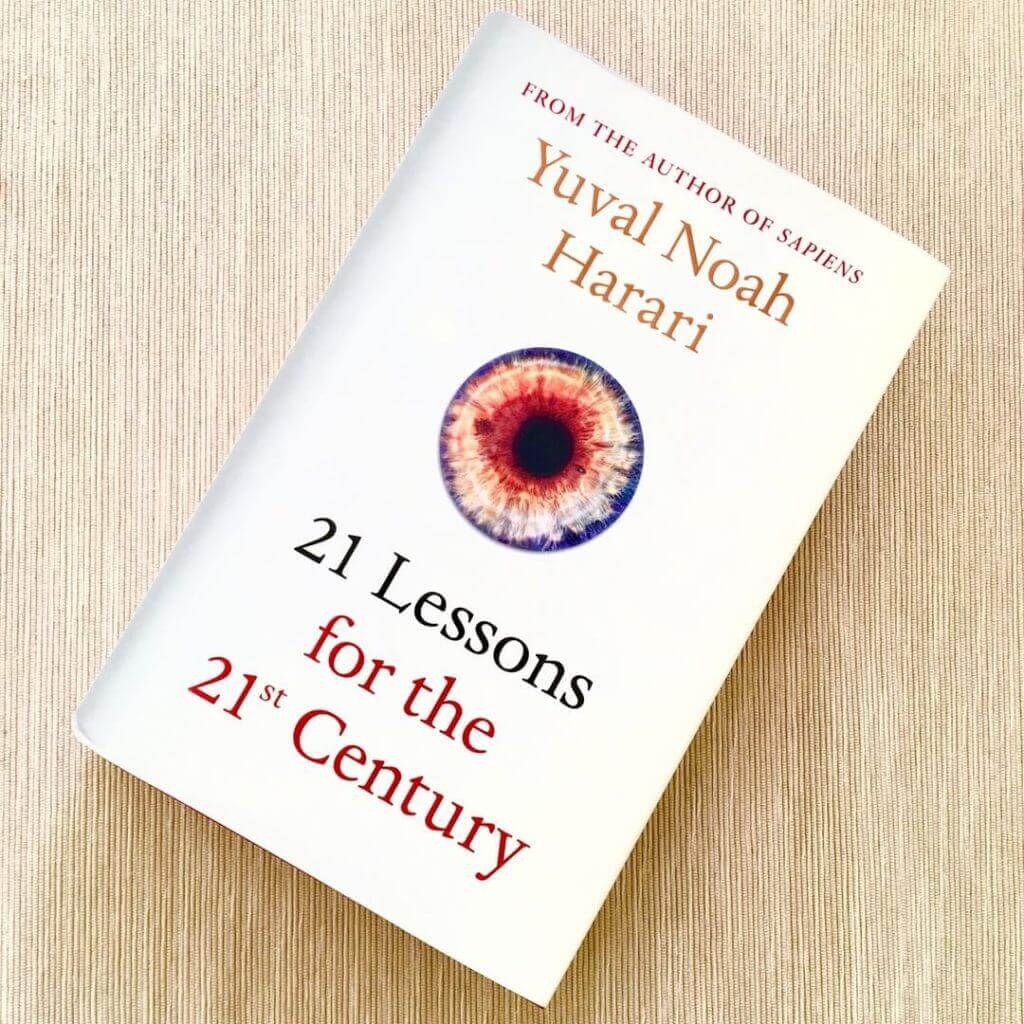A THREAD on key ideas from the book "21 Lessons for the 21st Century" by @harari_yuval:
1/
The best advice I can give a fifteen-year-old stuck in an outdated school somewhere in Mexico, India, or Alabama is: don’t rely on the adults too much. Most of them mean well, but...
1/
The best advice I can give a fifteen-year-old stuck in an outdated school somewhere in Mexico, India, or Alabama is: don’t rely on the adults too much. Most of them mean well, but...

...they just don’t understand the world. In the past, it was a relatively safe bet to follow the adults, because they knew the world quite well, and the world changed slowly. But 21st century is going to be different. Because of the increasing pace of change, you can never...
... be certain whether what the adults are telling you is timeless wisdom or outdated bias.
2/
When a thousand people believe some made-up story for one month, that’s fake news.
When a billion people believe it for a thousand years, that’s a religion, and we are admonished not to call it “fake news” in order not to hurt the feelings of the faithful.
When a thousand people believe some made-up story for one month, that’s fake news.
When a billion people believe it for a thousand years, that’s a religion, and we are admonished not to call it “fake news” in order not to hurt the feelings of the faithful.
3/
Humans were always far better at inventing tools than using them wisely.
Humans were always far better at inventing tools than using them wisely.
4/
At present, people are happy to give away their most valuable asset—their personal data—in exchange for free email services and funny cat videos.
It’s a bit like African and Native American tribes who...
At present, people are happy to give away their most valuable asset—their personal data—in exchange for free email services and funny cat videos.
It’s a bit like African and Native American tribes who...
...unwittingly sold entire countries to European imperialists in exchange for colorful beads and cheap trinkets.
5/
If you want reliable information, pay good money for it.
If you get your news for free, you might well be the product.
If you want reliable information, pay good money for it.
If you get your news for free, you might well be the product.
6/
It is extremely hard to discover the truth when you are ruling the world. You are just far too busy.
If you cannot afford to waste time, you will never find the truth.
It is extremely hard to discover the truth when you are ruling the world. You are just far too busy.
If you cannot afford to waste time, you will never find the truth.
7/
In a world in which everything is interconnected, the supreme moral imperative becomes the imperative to know.
In a world in which everything is interconnected, the supreme moral imperative becomes the imperative to know.
8/
If you want to know the truth about the universe, about the meaning of life, and about your own identity, the best place to start is by observing suffering and exploring what it is.
If you want to know the truth about the universe, about the meaning of life, and about your own identity, the best place to start is by observing suffering and exploring what it is.
9/
Technology isn’t bad. If you know what you want in life, technology can help you get it.
But if you don’t know what you want in life, it will be all too easy for technology to shape your aims for you and take control of your life.
Especially as...
Technology isn’t bad. If you know what you want in life, technology can help you get it.
But if you don’t know what you want in life, it will be all too easy for technology to shape your aims for you and take control of your life.
Especially as...
...technology gets better at understanding humans, you might increasingly find yourself serving it, instead of it serving you.
10/
The danger is that if we invest too much in developing AI and too little in developing human consciousness, the very sophisticated artificial intelligence of computers might only serve to empower the natural stupidity of humans.
The danger is that if we invest too much in developing AI and too little in developing human consciousness, the very sophisticated artificial intelligence of computers might only serve to empower the natural stupidity of humans.
11/
It takes a lot of courage to fight biases and oppressive regimes, but it takes even greater courage to admit ignorance and venture into the unknown.
It takes a lot of courage to fight biases and oppressive regimes, but it takes even greater courage to admit ignorance and venture into the unknown.
12/
We should never underestimate human stupidity. Both on the personal and on the collective level, humans are prone to engage in self-destructive activities.
We should never underestimate human stupidity. Both on the personal and on the collective level, humans are prone to engage in self-destructive activities.
13/
In a world deluged by irrelevant information, clarity is power.
In a world deluged by irrelevant information, clarity is power.
14/
Questions you cannot answer are usually far better for you than answers you cannot question.
Questions you cannot answer are usually far better for you than answers you cannot question.
15/
Homo sapiens is just not built for satisfaction. Human happiness depends less on objective condition and more on our own expectations.
Expectations, however, tend to adapt to conditions, including to the condition of other people.
When things improve, expectations...
Homo sapiens is just not built for satisfaction. Human happiness depends less on objective condition and more on our own expectations.
Expectations, however, tend to adapt to conditions, including to the condition of other people.
When things improve, expectations...
... balloon, and consequently even dramatic improvement in conditions might leave us as dissatisfied as before.
16/
Modern history has demonstrated that a society of courageous people willing to admit ignorance and raise difficult questions is usually not just more prosperous but also more peaceful than societies in which everyone must unquestioningly accept a single answer.
Modern history has demonstrated that a society of courageous people willing to admit ignorance and raise difficult questions is usually not just more prosperous but also more peaceful than societies in which everyone must unquestioningly accept a single answer.
17/
Unfortunately, teaching kids to embrace the unknown while maintaining their mental balance is far more difficult than teaching them an equation in physics or the causes of the First World War. You cannot learn resilience by...
Unfortunately, teaching kids to embrace the unknown while maintaining their mental balance is far more difficult than teaching them an equation in physics or the causes of the First World War. You cannot learn resilience by...
... reading a book or listening to a lecture. Teachers themselves usually lack the mental flexibility that the twenty-first century demands, since they themselves are the product of the old educational system.
18/
When the faithful are asked whether God really exists, they often begin by talking about the enigmatic mysteries of the universe and the limits of human understanding. ‘Science cannot explain the Big Bang,’ they exclaim, ‘so that must be God’s doing.’ After giving...
When the faithful are asked whether God really exists, they often begin by talking about the enigmatic mysteries of the universe and the limits of human understanding. ‘Science cannot explain the Big Bang,’ they exclaim, ‘so that must be God’s doing.’ After giving...
...the name of ‘God’ to the unknown secrets of the cosmos, they then use this to somehow condemn bikinis and divorces.
‘We do not understand the Big Bang – therefore you must cover your hair in public and vote against gay marriage.’
Not only is there no logical connection...
‘We do not understand the Big Bang – therefore you must cover your hair in public and vote against gay marriage.’
Not only is there no logical connection...
... between the two, but they are in fact contradictory. The deeper the mysteries of the universe, the less likely it is that whatever is responsible for them gives a damn about female dress codes or human sexual behaviour.
• • •
Missing some Tweet in this thread? You can try to
force a refresh









